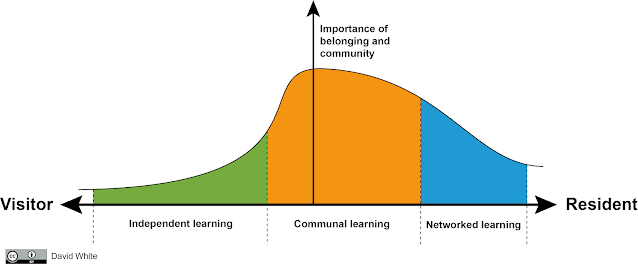 |
| Photo by Daniel Morris on Unsplash |
Once again it's time for one of the most widely read reports on the opportunities and challenges facing higher education around the world, the 2022 EDUCAUSE Horizon Report, Teaching and Learning Edition. This year's report comes in the wake of the pandemic that has had a profound effect on education and has lead to a major reappraisal of how we teach and learn in an increasingly uncertain and unstable world. As usual the report features a number of trends in educational technology that are having major effects on education as well as overarching societal and environmental factors. It also describes a number of plausible scenarios for higher education, and even society in general: growth, constraint, collapse and transformation. An added value is the wealth of links to relevant examples of the trends described and inspirational solutions. To provide a global perspective there are chapters written by experts from Australia, Canada, Mexico, Saudi Arabia and the USA as well as a corporate view. Sadly voices from Africa and South America are not represented.
Higher education likely will never be the same again, for these and many other reasons that have emerged just within the past two years.Not surprisingly, the word hybrid is used a lot in the report. Universities are spending a lot of money on technology to equip classrooms for hybrid teaching with sophisticated systems with multiple cameras, screens and microphones to allow everyone to participate as equitably as possible. However, no amount of high-tech will work unless teachers and students are confident in using it and the teaching is suitably adapted. Similarly, the rise of hybrid working will lead to changes in campus design with fewer teachers, administrators and students on site.
Remote work is making its way into job descriptions and contracts on campus, and institutional leaders are having to rethink important aspects of their culture and operations, such as interpersonal staff and team communications, the use of facilities and on-campus office and desk spaces, and staff and faculty training and support for their device and connectivity needs.
Some students will simply conclude that they cannot afford the cost of a degree, particularly in regions and at institutions where rises in tuition and other related expenses simply seem unmanageable. Other students will conclude that the traditional college degree no longer meets their personal and professional needs, or they will seek alternative opportunities for acquiring the knowledge, skills, and credentials they need for successful job placement and career advancement.
Learning analytics, artificial intelligence and cybersecurity also feature heavily in the report but earlier tech-optimism is now clouded with concerns in terms of how student data can be used in a responsible and ethical manner. The full potential of learning analytics and AI has not been realised yet, often due to the fact that most institutions have so far failed to integrate all their systems to be able to tap into the vast resources of data they possess. Even the data available in the learning management system is seldom exploited. Will students accept that their data is analysed and profiles created that might not always be to their advantage?
As previous EDUCAUSE research has found, for example, students may be more or less comfortable with their institution collecting and using their data depending on the type of data being collected and used. And many students may not fully understand why or how their data are being collected and used, eroding their trust and confidence in the institution’s use and protection of their data and subsequently eroding their trust in their institution overall.
Although the report shows the potential of the trends it describes it does not hide from the storm clouds hanging over all of us in terms of the climate crisis, increasing political instability and the global rise of misinformation and anti-scientific thinking. We already see an increase in political control of what is taught at universities and a decrease in the public funding of higher education and the report does not see this ending in the short term. This can lead to universities seeking more private funding and risking that major benefactors influencing policy and strategy in ways that limit academic freedom.
Of course there are other issues or trends not mentioned in the report but I still think this is the most accessible summary of the challenges facing higher education today and one that you can certainly send to decision makers at your institution. If you'd like another perspective as a complement, then please have a look at Mark Brown's excellent article from December 2021, What are the Main Trends in Online Learning? A Helicopter View of Possible Futures (Asian Journal of Distance Education. Vol. 16 No. 2, 2021)
.


